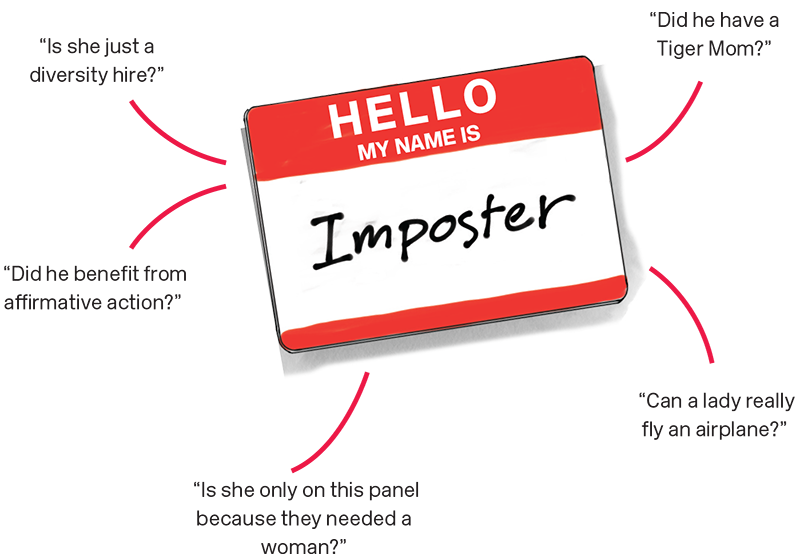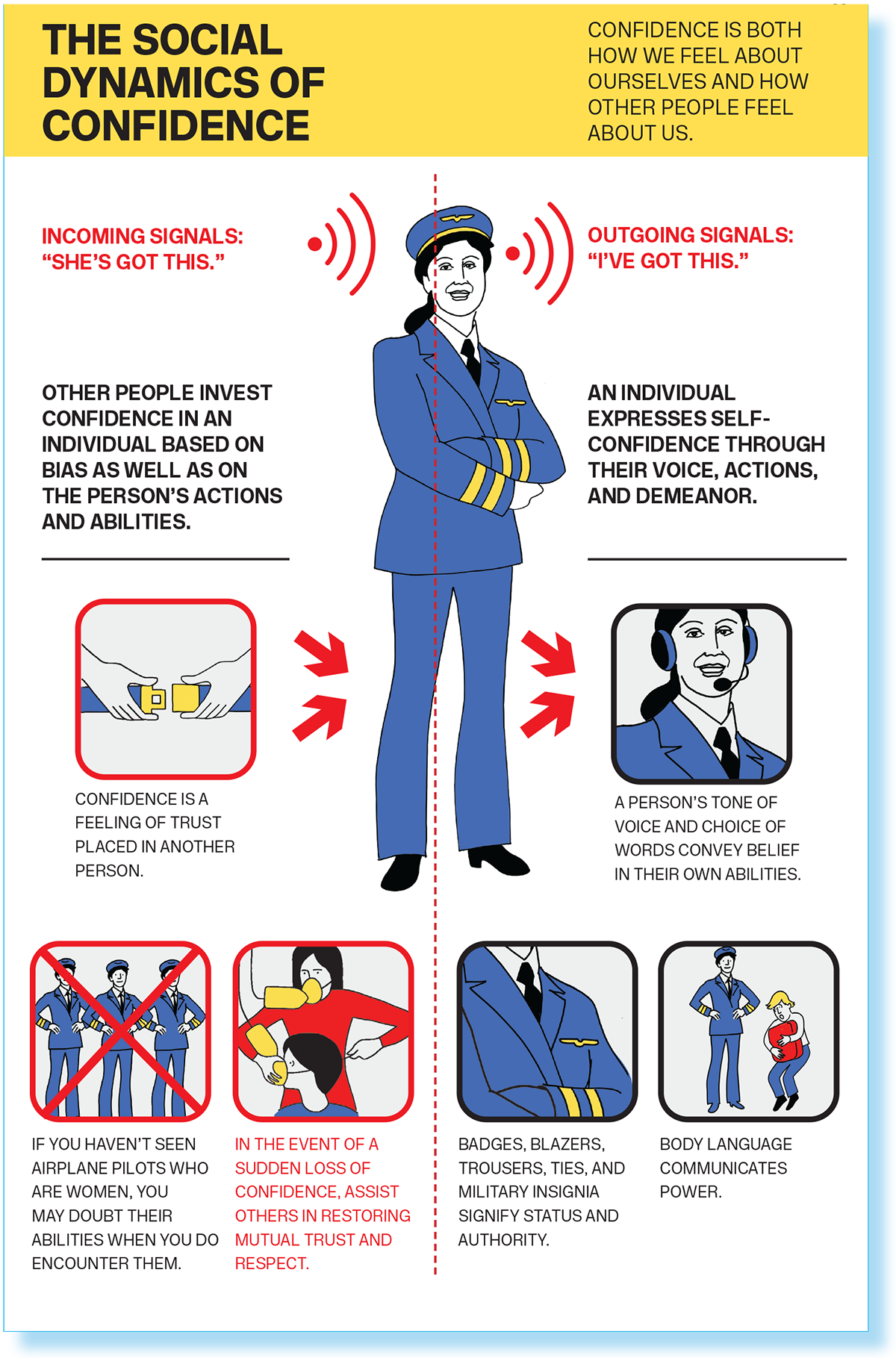
Editor's Note: The following is an excerpt from Extra Bold: A Feminist, Inclusive, Anti-Racist, Non-Binary Field Guide for Graphic Designers (Princeton Architectural Press, 2021), published here with permission of the author. Those interested in more from the book can read Kaleena Sales’ excellent—Teaching Black Designers—here.
Confidence is a sense of certainty and optimism about carrying out a task. Who owns this magical feeling? Are we born with confidence, or do we earn it? If we don’t have it, how can we get it? Confidence is something we feel about ourselves. It’s also a feeling about other people. (“I have confidence in her abilities.”) Confidence is not a fixed personality trait. It is a behavior expressed through actions, speech, and body language.
Confidence is not just personal. It’s social. Belief in your own abilities derives from your proven successes (that single soccer goal you made in third grade), as well as from support received from others (your parents showed up and cheered at the game, and you got a participation trophy even though your team lost). People who are expected to succeed are more likely to do so than people who are expected to fail. Your personal confidence is boost-ed by numerous forces throughout our lives—by parents, teachers, and soccer coaches and by the norms and narratives of the culture we live in. People who grow up being told that running the world is their right and privilege are more likely to feel confident than those who are marginalized and whose success is downplayed.
If you are seeking to become more self- assured, it’s helpful to view confidence as a social performance rather than an innate talent. Problems with confidence are yet another aspect of social inequality. Recognizing this can be a first step in enhancing belief in one’s own abilities. You can also begin to help others who are being held back and pushed to stay quiet.
The term confidence gap refers to the doubt and insecurity that women and members of marginalized groups often feel in professional contexts. Social scientists in the US have tracked statistical differences between the confidence displayed by men and women. For example, men are more likely to initiate salary negotiations and to ask for more money when doing so.

Illustration by Jennifer Tobias
The confidence gap is self-perpetuating. A person who says “Yes, I’ll do it!” is more likely to be trusted with challenging tasks than a person who constantly doubts and downplays their abilities. The person who is positive and upbeat about their skills may not really be more talented or competent, but they build up their expertise each time they give it a shot. Believing you can do something may precede being able to actually do it. Confidence is a form of courage. Although courage can drive foolish behaviors (bungee jumping? karaoke?), it can yield serious dividends in personal growth and trust from others.
Too much confidence is a problem, too. Overconfident people suck up social oxygen. A designer with excessive confidence might avoid researching a problem or might refuse to try multiple solutions. Journalist Nathalie Olah points out that many world leaders were born into social elites. Their confidence comes from a place of privilege. Big corporations and entire nations have been destroyed by leaders who put too much trust in their own instincts.
Willingness to examine your assumptions, double-check your work, and prepare vigorously for important events shows respect for others and curiosity about yourself. By learning to be a patient listener as well as an active participant, you can help build confidence equity!
The term imposter syndrome refers to the feelings of doubt and inadequacy many people suffer even after achieving an impressive goal, such as landing a great job or publishing a respected book. Rather than believing we earned our new position, we fear being exposed as phonies, frauds, or wannabes. Njoki Gitahi, a designer from Kenya, is a senior design lead at IDEO, one of the world’s most respected consultancies. Despite her success, she experiences doubt: “I wish I had the confidence of a straight White male, who might be thinking, ‘Everything’s going to go my way. I’m going to do this. I deserve this.’ I marvel at that kind of confidence.”
Although such feelings of self-doubt are, in Gitahi’s words, “bullshit,” they are nonetheless common, especially among people subjected to racism and/or sexism. The term imposter syndrome labels this feeling as an illness or delusion rather than a social problem. If we just tried harder to love ourselves, we wouldn’t feel this encroaching sense of failure.
In fact, imposter syndrome is triggered by external social forces, not just inner anxieties. Perhaps we doubt our own achievements because the people around us are, in fact, doubting us. Marginalized people are pushed to prove themselves more strenuously than those with presumed dominance. People subjected to sexism and/or racism are often harshly judged when displaying strength. Stereo-types such as “ballbuster” or “angry Black woman” demean those who speak up and question the status quo.
Members of an underrepresented group may feel isolated at work. Joining an affinity group, seeking out a mentor with a common background, and writing down your professional accomplishments can be helpful techniques. Kevin Cokley, professor of educational psychology at the University of Texas, Austin, explains that a work diary can not only help you take pride in your abilities, it can also be used as evidence if you file a discrimination claim.
References: Katty Kay and Claire Shipman, “The Confidence Gap,” Atlantic, May 2014; Stephanie Thomson, “A Lack of Confidence Isn’t What’s Holding Back Working Women,” Atlantic, Sep 2018; Kristin Wong, “Dealing With Impostor Syndrome When You’re Treated as an Impostor,” New York Times, Jun 12, 2018; Richard Thompson Ford, The Race Card: How Bluffing About Bias Makes Race Relations Worse (New York: Farrar, Straus and Giroux, 2009).
